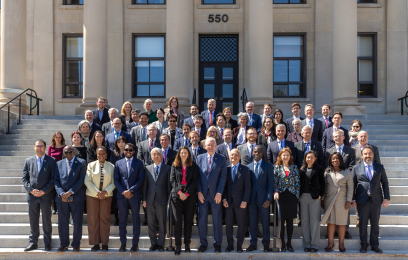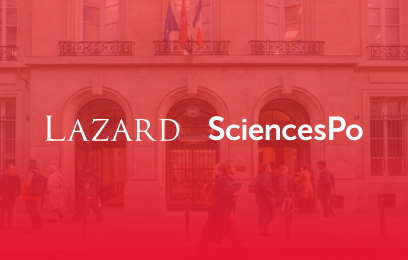Dr Vanessa Scherrer was appointed Vice President for International Affairs at Sciences Po in April 2018. Her mission will be to drive the international transformation of the institution that has been gaining in intensity for the past twenty years.
Sciences Po has become a leading international university with more than 470 partners worldwide. The institution has set up a large number of exchange programmes for students and faculty and was among the first to offer international dual degrees and build innovative academic and scientific alliances with institutions abroad. Today, half the university’s degree-seeking students are international students from 150 different countries. Sciences Po’s strategy has led to the development of a truly international curriculum, including a mandatory full year of study abroad for all undergraduate students. According to the Times Higher Education ranking, Sciences Po is now the most international higher education institution in France based on the proportion of international students.
Dr Scherrer takes over from Francis Vérillaud, who throughout an outstanding 25-year career at Sciences Po worked tirelessly to establish Sciences Po’s position as France’s leading university in the social sciences and as a truly global actor.
Sciences Po President Frédéric Mion: “Vanessa Scherrer has done a remarkable job of leading the Sciences Po Paris School of International Affairs, which in just a few years has become a leading school on the global stage and has raised Sciences Po’s profile across the continents. In that role and in her previous position as head of the Alliance Programme at Colombia University, New York, Dr Scherrer made a central contribution to implementing Sciences Po’s international strategy and strengthening our international appeal and reach. We have big ambitions for the years to come and I know that she will throw all her talent and efforts into promoting Sciences Po’s influence and excellence worldwide, with the support of our dedicated, quality staff and in continuation of the work of her predecessor, Francis Vérillaud.”
Until last October, Dr Scherrer was the Executive Director and Vice Dean of the Paris School of International Affairs of Sciences Po (PSIA), a school she founded and led with Ghassan Salamé in 2010 and later with Enrico Letta. Under her leadership, PSIA has become one of the world’s most respected and attractive graduate schools of international affairs. Dr Scherrer started her career at Columbia University in New York (2001-2010), where she founded and headed the Alliance Programme, a major platform for transatlantic cooperation in higher education and research involving Columbia University, the Ecole Polytechnique, Universtié Paris I-Pantheon Sorbonne and Sciences Po and supported by the French Ministry of Foreign Affairs.
Dr Scherrer holds a Ph.D. in Political Science from Sciences Po and is a member of PSIA faculty.
About Sciences Po
Sciences Po is a selective research university of international standing based on the values of openness and excellence. Sciences Po’s unique academic model combines expertise in the humanities and social sciences, multidisciplinarity and a professional grounding to educate professionals and citizens able to understand and transform society. Diversity is a key element of Sciences Po’s identity. The student body comprises 47% international students from 150 different countries and 27% scholarship students, up from 6% in 2000.
Press contact
Marie Frocrain: marie.frocrain@sciencespo.fr / 01 49 54 37 71

05.05.2025
CHOOSE EUROPE FOR SCIENCE: SCIENCES PO STRENGTHENS ITS POLICY OF WELCOMING INTERNATIONAL RESEARCHERS WITH THE RECRUITMENT OF NEW AMERICAN SCHOLARS
Paris, 5 May 2025 – Sciences Po, a world-class research university, has been host to a significant number of leading international scholars for over two decades. With nearly 50% of its student body made up of international students and one of the most open academic communities in Europe, Sciences Po offers an interdisciplinary environment suited to analyse contemporary disruptions, all within a framework that safeguards academic freedom and freedom of speech — key conditions for academic work.
“Europe’s strategic autonomy lies in part on an intellectual ambition: acknowledging universities as a central pillar of European identity, agency, and influence. Through the defence of academic freedom, the promotion of open debate, and the protection of long-term knowledge, higher education constitutes a critical infrastructure of our democracies.”Luis Vassy, Director of Sciences Po.
In December 2024, Sciences Po launched a call for applications within the “Sciences Po Visiting Fellowship” programme, aimed at welcoming scholars from the United States. The two selected fellows, Professor Sanyu A. Mojola from Princeton University and Professor Rachel Beatty Riedl from Cornell University, were chosen from among numerous prominent applicants. They will join Sciences Po for one semester: Professor Mojola will be hosted by the Centre for Research on Social Inequalities (CRIS), and Professor Riedl by the Centre for International Studies (CERI).
Sanyu A. Mojola is a Professor of Sociology and Public Affairs and holds the Maurice P. During Chair in Demographic Studies at Princeton University. Her research, which combines multiple methodological approaches, investigates how societies produce health and illness, with a particular focus on the HIV/AIDS pandemic in diverse contexts such as Kenya, South Africa, and the United States. She has studied how social dynamics within schools, communities, labour markets, cities, and ecosystems contribute to health inequalities. Her work pays particular attention to the ways in which life course, gender, ethnicity, and socio-economic status shape health outcomes.
Rachel Beatty Riedl is the Director of the Center on Global Democracy at the Brooks School of Public Policy and Professor in the Department of Government at Cornell University. Her research focuses on democracy and authoritarianism globally, with a particular emphasis on Africa. She explores regime transitions, participation, institutions, political parties, religion, and local governance.
This initiative highlights Sciences Po’s commitment to fostering open, rigorous, and independent research. The Visiting Fellowship programme will be renewed for the 2026–2027 academic year, with two new positions opened.
Strong and Longstanding Ties with the United States
Sciences Po maintains close educational and research ties with the United States. Each year, between 15% and 20% of all American students who choose to study in France do so at Sciences Po. Americans represent the largest international student population at the university, with nearly 1,000 enrolled for the 2024–2025 academic year — from among over 140 nationalities. This is in part due to our 84 university partnerships, including 10 dual degree programmes with leading institutions such as Columbia University, UC Berkeley, and Georgetown University. The United States is also the leading destination for Sciences Po students in their third year abroad: in 2025–2026, over 220 students will study at one of our American partner institutions.
Our research collaborations with the United States are equally robust. These include the Alliance programme, which brings together Columbia University, École Polytechnique, Université Paris 1 Panthéon-Sorbonne, and Sciences Po to promote bilateral academic cooperation; and our doctoral fellowship programme with seven American partners, aimed at building a transatlantic network of young researchers. At present, nine American scholars are members of our permanent faculty (out of 280), alongside numerous PhD candidates, postdoctoral researchers, and visiting professors — among them the Nobel Prize-winning economist Joseph Stiglitz.
Read more

